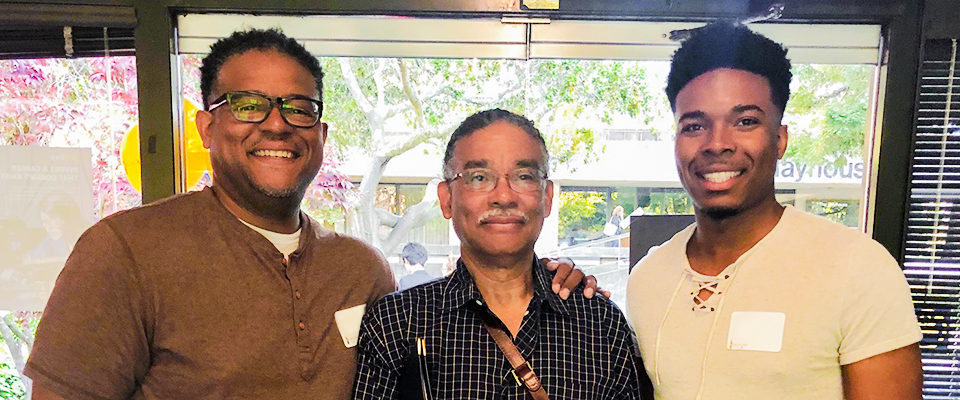Thomas Tramble continuously exposed Kirk to Cal throughout his childhood, bringing him onto campus and to events. Eventually, Kirk ’93 got his degree in electrical engineering and computer science from Cal, and did the same with his children. Twenty-five years later, Kirk’s son Gabriel ’18 earned his degree in media studies. Gabriel says if he has children, he definitely would want them to come to Cal.
The Trambles attended Cal at different times, but their experiences as Black students at an elite university were nearly the same. Thomas was racially profiled at work, Kirk felt isolated as one of a handful of Black students in the engineering program, and Gabriel dealt with microaggressions from students and faculty.
Gabriel and Thomas remember when the National Guard came to campus in response to heated protests about contentious issues. For Thomas, it was the Free Speech Movement. For Gabriel, it was Milo Yiannopolous’s speaking engagement. Gabriel doesn’t think the university administration considered how federal law enforcement could create a hostile environment.
“That was pretty frightening because, just in general, Black males aren’t seen as the nicest people, so I kinda felt like I was a prisoner just trying to walk around to class,” says Gabriel.
Lack of resources, a low number of Black students attending Cal, and everyday microaggressions were par for the course for Thomas and Gabriel.

Kirk, however, was fortunate to enjoy an abundance of resources for Black students. “I was able to experience probably the peak of academic support services that were available for African American students. Those organizations were in place and active in helping students.”
In the 1990s, the Black student population was around eight percent, and there were resources dedicated to Black student organizations. However, just as his father and son faced challenges, Kirk had his own. Persistent debates over affirmative action on campus created an uneasy future for many organizations.
“As difficult as [the Black experience at Cal] is and was, it still holds a special place for Black alumni and we cheer on family members…to go there. It’s just ‘how do we make it better.’”
—Kirk Tramble ’93
“I came to campus and was immediately [presented] with the opportunity to protest.” Proposition 209 was passed in 1996, ending considerations for gender, race, sex, and ethnicity in university admissions. Kirk says the fallout was swift. “The response was to ultimately shut down many of the programs that were the highest serving programs for African Americans on campus.”
Resources decreased for the Black student population, which dropped to two percent. Cal, like other universities in the state, struggled.
Based on the University of California Student Experience Survey in 2014, Black students said the campus climate was poor. The Black Student Union responded to the survey by creating a list of ten demands, which evolved into the African American Initiative in 2017. With 20 students, faculty, and student organizations serving as committee chairs and stakeholders, the initiative aims to raise $20 million to increase student resources, hire more Black faculty, improve the campus climate, and increase efforts to recruit Black students to Cal.
For the past two years, Kirk has been a part of the team charged with administering the scholarship, and Thomas has volunteered to interview applicants.

While Kirk and Gabriel say the initiative is a good first step, there are still kinks to iron. Kirk says there was some ambiguity over who would govern and distribute funds. Gabriel says he’s heard people say that the funds should be for all students. Ultimately, the Cal Alumni Association stepped in as the appropriate body to administer and facilitate the program. In the first year, 28 students from low-income families were awarded multi-year scholarships. An additional 12 students received the scholarship for the 2019–2020 academic year.
The initiative is a step in the right direction, but Kirk says it has yet to meet the financial needs of other Black students. In conversations with alumni, Kirk says, the scholarship isn’t enough. Programming is needed as well.
Kirk is optimistic that as more money comes in, more resources and programs will as well. “I think that’s what’s kinda interesting about the Black experience at Cal. As difficult as it is and was, it still holds a special place for Black alumni and we cheer on family members…to go there. It’s just ‘how do we make it better,’” says Kirk.
For Thomas, Kirk, and Gabriel, the opportunity to go to Cal was like “a dream come true.” They’re open about the fight Black students have had for resources—like the Black Studies Department and the Fannie Lou Hamer Black Resource Center—but three generations deep, the Trambles are emphatically proud Cal Bears.


















